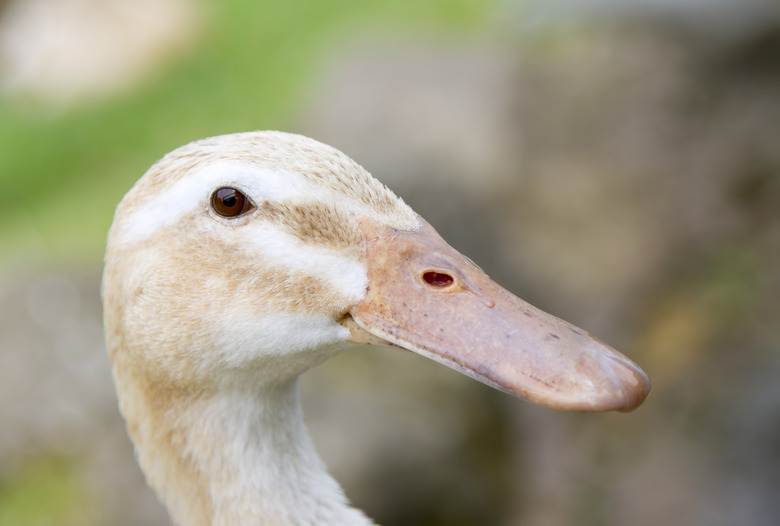Eye Infection In A Pet Duck
With the exception of trauma, any eye problem a duck has usually means he's suffering from a systemic illness. Good husbandry helps prevent eye infections, but if you see eye discharge or swelling, call your avian veterinarian immediately and isolate the duck from any other domestic birds on your property, as many avian diseases cross species.
Riemerella Anatipestifer
Riemerella Anatipestifer
Infection with the bacteria Riemerella anatipestifer is also known as new duck disease. Eye discharge is a primary symptom, along with head shaking, incoordination, diarrhea and lethargy. Preventing new duck disease is easier than curing it — the mortality rate is high, but a vaccine is available. Your vet might not be able to save your individual pet but, if you keep a flock, she can provide you with antibiotics to put in their feed, potentially reducing infection and mortality.
Pigeon Pox
Pigeon Pox
Ducks are susceptible to pigeon pox. Viral in nature, pigeon pox causes lesions on any unfeathered areas, including the eyes. Your duck's eyes might swell up, rendering him partially or completely blind. The good news is that pigeon pox doesn't affect the eyeball. Once the pox has run its course, vision should return. You can vaccinate your duck for the disease. If your duck comes down with pigeon pox, your vet might recommend gently bathing his eyes in saline solution, along with supportive care.
Salmonella in Ducks
Salmonella in Ducks
Not all ducks who carry salmonella will become affected by it. They carry the bacteria in their gastrointestinal tract, easily shedding it in feces. If your duck does come down with active salmonella, he'll exhibit diarrhea and lethargy, and might stop eating. He could also experience conjunctivitis, or eye inflammation and discharge. Your vet might prescribe antibiotics to clear up the infection, along with anti-diarrheal medications. Because ducks can spread salmonella to people — even if they show no signs of the disease — always wash your hands after handling your duck.
Preventing Eye Infections
Preventing Eye Infections
Along with vaccination, you can prevent certain diseases causing eye infections with good duck husbandry practices. Purchase only new ducks certified as disease-free, and quarantine them for several weeks before introducing them to your established flock. Domestic ducks are messy by nature, so you must work hard to keep their shelter and pens clean. If your ducks swim in a wading pool, change the water daily. Feed your ducks a nutritionally complete feed designed for them, even if they have access to forage.
References
- Cornell University College of Veterinary Medicine: Duck Health Care
- The Poultry Site: Anatipestifer Disease, New Duck Syndrome, Duck Septicaemia
- Avian Biotech: Salmonella
- Minnesota Department of Health: Health Officials Warn of Disease Risk From Handling Chicks, Ducklings
- University of Florida: Eye Disorders of Poultry
- Michigan Department of Natural Resources: Avian Pox
